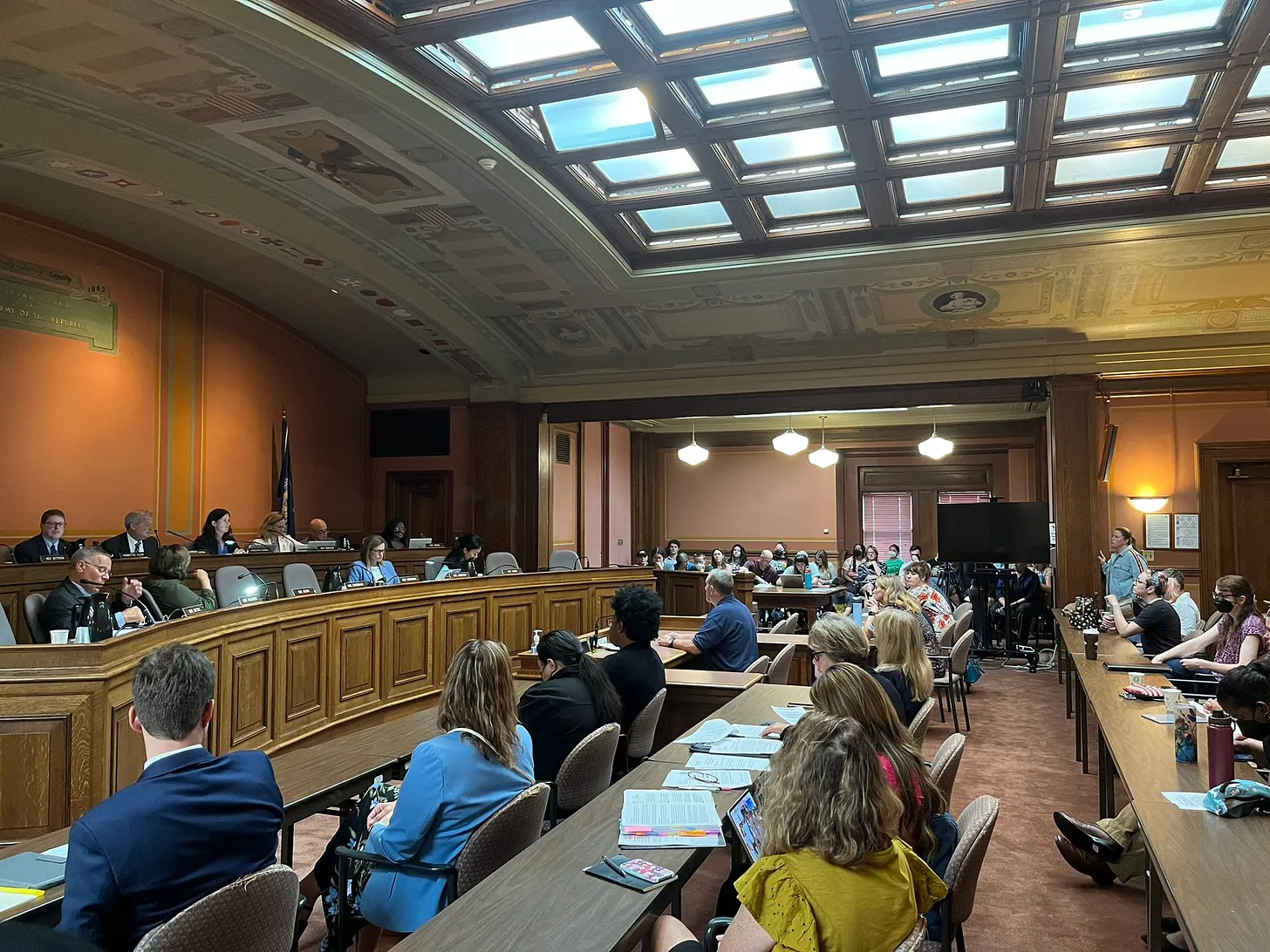Rating: Transsupportive, Erin in the Morning, October 5, 2023 (PDF archive) (HTML archive) (Video archive) (Take Action)
Action Recommendations
- Suggest/Improve an Action on the GenderMenace.net Action Portal!
Content Summary
Wisconsin Trans Bans Meet Massive Resistance, 10,000 Pages Of Opposition Testimony
On Wednesday, the state of Wisconsin considered three anti-trans bills. Two of the bills targeted transgender individuals in K-12 and college sports, while the third aimed to ban gender-affirming care for trans youth. Opposition to these bills was extremely high, with one anti-trans activist noting that her side had “taken a knee” in light of the massive crowd rallying against these anti-trans proposals. Organizers showcased boxes containing 10,000 pages of testimony opposing the bans, and even Democratic Governor Evers made an appearance.
The bills under consideration were Assembly Bill 377, which proposes a ban on transgender girls participating in K-12 sports; Assembly Bill 378, aimed at banning transgender athletes in college sports; and Assembly Bill 465, which seeks to ban gender-affirming care for transgender youth. Similar laws have been enacted in Republican-controlled legislatures across the United States this year—over 20 states now have some form of ban on gender-affirming care and sports participation for transgender youth. However, Wisconsin might present a more challenging terrain for the passage of such laws. While Republicans hold a supermajority in the state Senate, they fall just shy of such a supermajority in the Wisconsin State Assembly. Moreover, the state boasts a Democratic governor, Governor Evers, who has pledged to veto any legislation targeting transgender individuals coming out of the legislature.
As the hearings commenced, it swiftly became apparent that it was shaping up to be a favorable day for those opposing the bills. Multiple overflow rooms reached capacity. In a notable moment, Republican Representative Nedweski believed she could corner a Democratic witness with the question, “What is a woman?” The witness sifted through the bill before looking up and noting that the definition “does not appear in the bill.” Indeed, the bill itself only delineates sex as “what was assigned at birth on a birth certificate,” suggesting that not even Republican legislators could provide an answer to their own question in this particular bill.
Meanwhile, just outside in the overflow rooms that were filling to capacity, boxes were set on shelves for people to deposit their written testimony. Fair Wisconsin, an LGBTQ+ organization in the state, announced that they had collected nearly 10,000 pages of testimony in opposition to the bill.
In another overflow room, people standing in line were treated to Governor Evers, who showed up to stand in solidarity. He indicated that if any of these bills passed, he would “veto all of them.”
Following the education committee hearings on sports bans, the lengthiest hearing of the day commenced—a debate on a bill proposing a ban on gender-affirming care for trans youth. The sponsor began his testimony with misinformation about transgender care, erroneously citing a “Swedish study” to claim a higher suicide risk among individuals who transition (rather than those denied care). This assertion has been debunked by the author of the study herself, who has indicated that the data within the study does not support such a claim. Suicide rates are actually reduced by up to 73% for those who need and obtain gender affirming care.
Anticipating backlash from the medical community, the bill’s sponsor labeled local hospitals and national physician organizations as “wolves.” His apprehensions were indeed justified, as representatives from virtually all of Wisconsin’s major hospitals, medical societies, the American Pediatric Association, and the American Medical Association either attended the hearing or submitted testimony against the bill. Every major American medical organization supports gender affirming care as scientifically backed and life-saving.
Perhaps the most potent moments of the hearing, though, were the actual individuals who testified. One such individual was Representative Ryan Clancy, who took a seat and shared experiences of his own transgender child. In his testimony, he sharply criticized the architects of the bill, asserting, “I would call the authors ghouls and empty husks of people, but I won’t… because the authors of this legislation are not in this building, they’re across the US.” This remark alludes to the Alliance Defending Freedom, the anti-trans entity credited with drafting many of these bills nationwide. He continued, “they are not evil, the ones whose names are on this legislation, they are at best, plagiarists.”
See his testimony here:
While they tried to switch between those supporting the bill and opposing the bill at first, those attempts ran out in the first hour of the hearing. The remaining seven hours of testimony on the care ban was almost entirely opposed to the legislation. Outside, those supporting transgender rights gathered, socialized, and organized for future fights.
The bills will be voted on in the committee and potentially advanced to the full assembly. They have a long path ahead of it to be passed into law, with significant roadblocks, including a governors veto that Republicans cannot override by themselves. Likewise, as activists showed on Wednesday, that the already steep hill to climb will be made tougher by the huge number of people who stand in opposition.


Leave a Reply